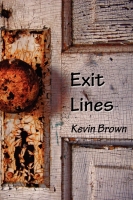Issue 2 - Winter 2010 Reviews Anxious Music Blood Dazzler Cities of Flesh and the Dead Crazy Love Cures and Poisons Dark Card and Mom's Canoe Fire Pond How to Live on Bread and Music Mister Skylight Paternity Perpetual Care Pictures in the Firestorm Rhapsody of the Naked Immigrants Rock Vein Sky Six Lips Slaves to Do These Things Slide Shows The Air around the Butterfly The Guilt Gene the nested object Interviews
 | Jessie Carty: Congratulations on the release of your first collection of poetry, Exit Lines. How did you know when you had a full-length collection of poetry ready for publication consideration? Kevin Brown: When I decided to put together a collection of poems, I had probably been writing for a decade or so, but I had not been very serious about it. I would write whenever inspiration struck and submit to journals periodically (no pun intended, but enjoyed) when I had the time. I had tried putting together a collection about five years or so before, but I had no idea what I was doing or how to go about it. The main impetus for this collection was that I began to take writing more seriously. I had some success two years ago when I had a poem published in REAL, a journal I had not thought would accept my writing. From there, I began setting aside regular times to write and began producing more poetry and better poetry. That success gave me the confidence to look into a collection of poems. How did you go about putting together the collection? The book began with the title "Nothing Left to Say: Poems on Faith and Love," which is how I structured the work. Those tend to be two subjects I come back to again and again, so I thought they would provide a clear theme or structure to the book to keep it from being little more than a random collection of poems I thought were my best. My editor suggested a few other titles, then encouraged me to include a few more poems, which I did. However, the underlying structure of the book is still largely faith and love. I noticed in Exit Lines that you have, no pun intended (but as you said – enjoyed), an appreciation for the line and physical format of the poem on the page. I’d love to hear about how you deal with the idea of line and form in poetry. I have struggled with line and poetic form for as long as I can remember. When I was once asked how I knew when to break a line, I simply responded, "When it feels right." This approach did not work as often I liked, so I kept thinking about it. We had a visiting writer come to our university, and he guest lectured in one of my classes (an introduction to the discipline class, not a writing class). For some reason, he began talking about line breaks, and it changed the way I think about them. I'm still not exactly sure how they work, but I spend a good deal of my time thinking about them, and I still struggle mightily with stanza breaks. I tried one formal poem, a villanelle, and that was enough to send me back to free verse, so I suppose I'll continue to struggle with them both. Part of the fun in writing is the actual struggle through the process. Can you describe your process for us? I actually write my poems in my head first, as I write while I'm exercising (either biking or walking, as running takes too much of my focus). I begin with an idea, a story, or an image and keep working it over and over in my mind, revising as I go. Once I get what would be considered a complete rough draft in mind, then I recite it again and again, changing a word or phrase here and there until I get it where I'm reasonably happy with it. This explains why my poems are never very long, as I simply could not remember them. Occasionally, I will think to myself when I come up with a phrase or a sentence, "That's where a line break should go." Usually, though, I write it out without worrying about line breaks, just using five line stanzas (I used to use four, then switched to five for no particularly good reason). When I'm writing it out by hand, I might change words or phrases again, giving me another layer of revision. I do this in the morning before I start my day of work, as I just don't have time during a day of teaching to think about poetry, so I would lose the ideas and images. I then type it out when I get home in the afternoon or evenings (sometimes, if life is terribly hectic or I've been on the road and written a poem, they don't get typed until several days later). I then change other words or phrases, if necessary. Once it's typed, I then look at form, breaking lines and stanzas on the computer. I used to think my approach to writing in my head was terribly odd, as the models I've seen always talk about revising on paper, and almost everyone is shown facsimiles of writer's notes with words, phrases, or entire stanzas scratched out. However, I recently read that Wallace Stevens would walk to work every day, two miles, and he would work on poems in his head as he walked. When people asked if they could walk with them, he only allowed them to do so if they promised not to talk to him. This story makes me feel much more normal, at least as far as poetry is concerned. Normal is so over-rated! As I was reading through your collection, I really picked up on certain topics (as I’ve heard some describe them – obsessions) that seemed to reappear throughout the collection. You mentioned you were thinking about faith and love while putting together the collection, but do you think there is any one poem that epitomizes the overall book? Since these poems come from over a decade of writing, there really isn't a poem that sums up the collection. They come from such a wide variety of experiences and times in my life that it is only the general themes that hold them together. Looking back at them, what they probably have in common is how many of them came from reading I was doing at the time. I always thought that "Diagramming Won't Help This Situation" came from an impending breakup, but, when I went back and looked at my journal, it actually came from something I read, which I cannot even remember now. "The Waves and Whales and Ways of God" came from a novel by Julian Barnes (The History of the World in 8 1/2 Chapters, I believe), which "Alternative History" came from my reading about Einstein's wanting to be a watchmaker. Of course, the others come from people I've known or places I've lived, but I expect most of us draw from those sources. I love how you pull from a variety of sources. Are there any conscious tricks you use to keep yourself writing? Now that I've become a more regular writer, I use some sort of series to keep the pump primed. Last year, I worked on a series of poems based on archaic words from the Oxford English Dictionary ("acnestis," for example, is that place on one's back that one cannot reach to scratch, a great word). Thus, I would read one of those words, then go workout and let it marinate until I came up with something that was beginning to resemble a poem. Right now, I'm using the Catholic lectionary, drawing on the lives and legends of the saints. The challenge with both of these is to take something literal and turn it into metaphor, but, then again, that's the job of a poet. Besides being a poet and non-fiction writer you are also a teacher who has completed a MA, MLS and PhD. Do you think your teaching has any influence on your writing? Oddly enough, I don't think that teaching has much of an influence on my writing at all. I don't teach any creative writing classes, as my degree is in literature, and I've always kept the two parts of my life rather separate. I'm also fairly successful at keeping the literary critic quiet when I'm writing. There have been times when I was composing a poem, and I thought, "Ah, someone studying this poem would comment on thus-and-so," but I was able to keep going and just the literary critic enjoy that moment. However, my writing has influenced my teaching a good deal, as I talk about literature from a different point of view than those who study it, but do not write it. I often talk about what I think an author is trying to do at a certain point in a work and share from my experience as a writer when it can help students understand how writers think. This year, the two have begun to merge a bit more, though. I am preparing to begin a low-residency MFA program at Murray State University, so I have been thinking much more about writing, and my students see me as more of a writer than they have in the past. I'm curious to see how this change affects teaching and vice versa, as I might be teaching a poetry writing course in the near future. You seem to really pull a great deal of joy from being a poet. Can you share some more of that with us? I have always loved to play with words, sometimes purposefully, sometimes not. My mother loves to tell the story of my watching the old Nationwide commercials. When the announcer would say, "Nationwide is on your side," I would pull up my shirt, look at my side, and say, "It's not on my side." I love puns and the inherent slippery-ness of language and the fun that they can lead to. Thus, when I come up with a clever phrase or metaphor, I am amazed again at the flexibility of language. Besides the joy of language, what value do you think there is in poetry? I often tell my students that poetry has no value whatsoever. Of course, I mean that the world does not value it, which is why it doesn't pay. No one, outside of a few friends or family members, cares if they ever write another word, and the same goes for me. However, I also tell them the story of my first year teaching. I was in bed when my college roommate called me to talk for a few minutes. It turns out that he had been diagnosed with HIV (he thought; it turns out that the diagnosis was wrong, but I only found that out more than ten years later). The first thought that went through my mind was actually a poem, and it was a poem that I had never read or taught. It was on the facing page of a poem I had taught when I was in graduate school, and, for some reason, the closing of the poem stuck in my mind. It was a poem using cats and dogs to talk about the awareness of death, and the closing said something like, "Dying is what the living do/Living is what the dying do." Those lines reminded me that we're all always dying. That is what poetry can do for us, remind us of the important truths of life that we ignore when going about our day-to-day lives, and that's more valuable than we care to admit. Interviewed by Jessie Carty. |
